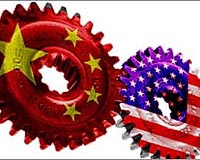| . |  |
. |
Brussels (AFP) Feb 23, 2010 EU defence ministers, meeting in Spain Wednesday, will consider increased military ties authorised by the bloc's Lisbon Treaty, but with EU diplomatic chief Catherine Ashton notable by her absence. The two-day meeting will not be the baptism of fire which some had been predicting for Ashton, the EU's High Representative for foreign affairs and security policy -- a post also created by the new treaty, She cancelled her participation in the defence talks, in part to represent the European Union at the investiture ceremony of the new Ukrainian president, her spokesman said. Some participants at the Palma meet had been hoping to hear Ashton's intentions as the first holder of the beefed-up foreign and defence job. "Especially as, thanks to the treaty, the opportunity is there to reinforce Europe's defence, to give it more visibility," as one European diplomat put it. "Her predecessor Javier Solana didn't miss a single meeting of this type with the defence ministers," one European diplomatic source said, recalling the holder of the lesser pre-Lisbon foreign policy post. "Something has changed in the order of priorities," she added. Spain, which holds the EU's rotating presidency for the first half of the year, had made the relaunch of a European defence strategy one of the "fundamental" objectives of its six-month tenure. "We are starting from scratch with the Lisbon Treaty," as another European diplomat put it. That text, which had a long and painful gestation, offers the possibility of a pilot group of EU nations to work together in a particular military area, without fearing a veto from another European capital. The only condition for creating such a "permanent structured cooperation," as the eurospeak puts it, is that there is a qualified majority of the 27 EU nations in favour. The European defence ministers will also on Wednesday discuss the European operations already in place or in the planning stages -- in Kosovo, against Somali pirates, training for Somali police and military, and logistical aid for quake-hit Haiti. On Thursday their thoughts will turn to Europe's own institutional evolution, with lively discussion on the cards. Several countries, notably France, believe that defence matters should not be lost in the future European diplomatic service, under Ashton, and that it should conserve its specificity. Regardless of Ashton's role, the key initiatives remain decisions for the 27 national capitals. But in general there is support for a reinforcement of Europe's defence capabilities. Paris has said it is prepared to lead by example, via a France-Germany security policy as a precursor to "a pan-European strategy" as foreign minister Bernard Kouchner put it earlier this month. Italy has recently spoken in favour of some kind of European army. That's a possibility the Lisbon Treaty opens the way for, according to its supporters, even if it recognises that "the defence of Europe" is the remit of NATO, as the more transatlantic, led by Britain, insist. Nevertheless a British governmental report published this month spoke of the possibility of military cooperation with Europe, and notably France, in order to make budget savings at a time of belt-tightening on all fronts. France's reintegration last March into NATO's military structure could also, counterintuitively, relaunch the European defence debate. History invites caution. The 1998 Anglo-French declaration of Saint-Malo, called for an EU "capacity for autonomous action." However serious differences among Europeans over the Iraq war in 2003 put the brakes on that initiative. A British general election, expected in May, could return a Conservative government to power, a much more eurosceptic and Atlanticist prospect than the current Labour administration.
Share This Article With Planet Earth
Related Links Learn about the Superpowers of the 21st Century at SpaceWar.com Learn about nuclear weapons doctrine and defense at SpaceWar.com
 China calls on US to 'undo damage done' by Dalai Lama meet
China calls on US to 'undo damage done' by Dalai Lama meetBeijing (AFP) Feb 24, 2010 China on Tuesday demanded the United States "undo the damage done" by a meeting between President Barack Obama and the Dalai Lama, while lashing out anew over US arms sales to Taiwan. The latest angry barrage indicated tensions had not abated between Beijing and Washington - an unwelcome sign for negotiators working on the thorny North Korea and Iran nuclear dossiers, who need the world pow ... read more |
|
| The content herein, unless otherwise known to be public domain, are Copyright 1995-2010 - SpaceDaily. AFP and UPI Wire Stories are copyright Agence France-Presse and United Press International. ESA Portal Reports are copyright European Space Agency. All NASA sourced material is public domain. Additional copyrights may apply in whole or part to other bona fide parties. Advertising does not imply endorsement,agreement or approval of any opinions, statements or information provided by SpaceDaily on any Web page published or hosted by SpaceDaily. Privacy Statement |